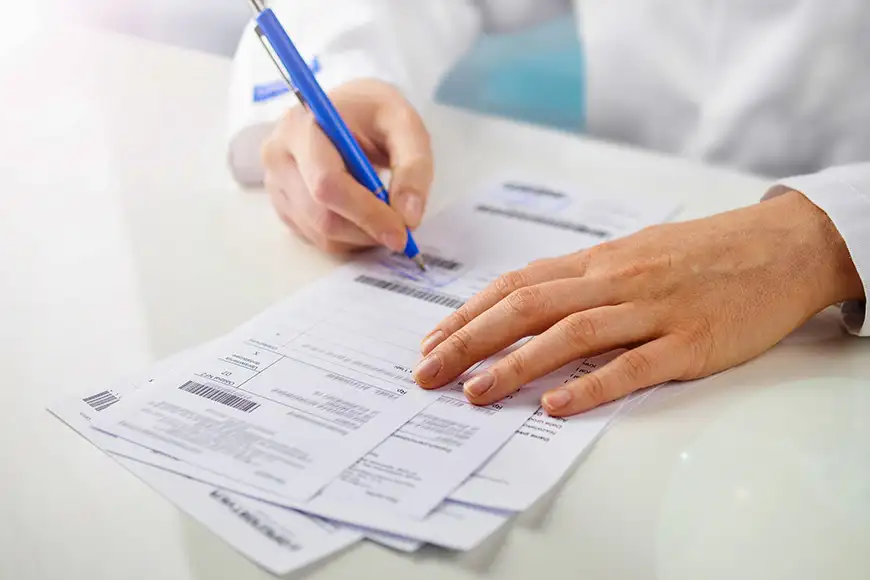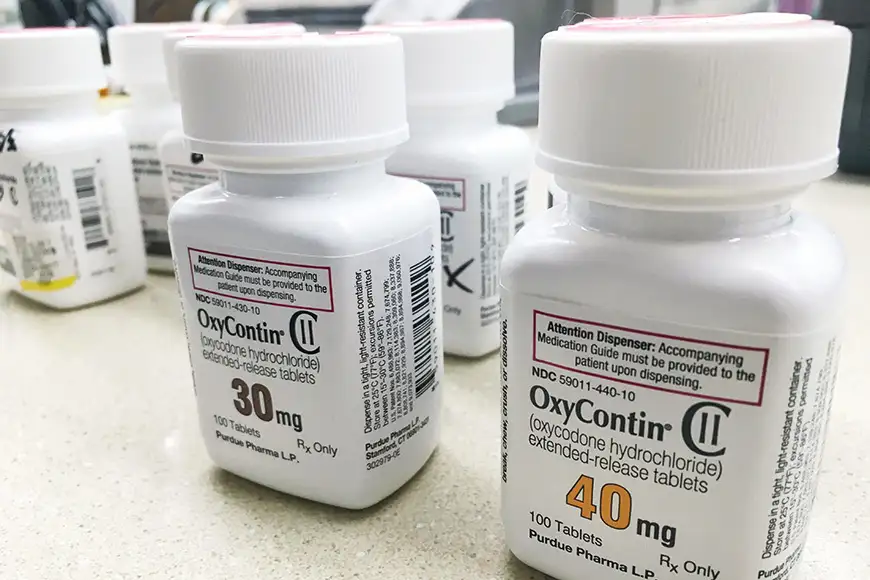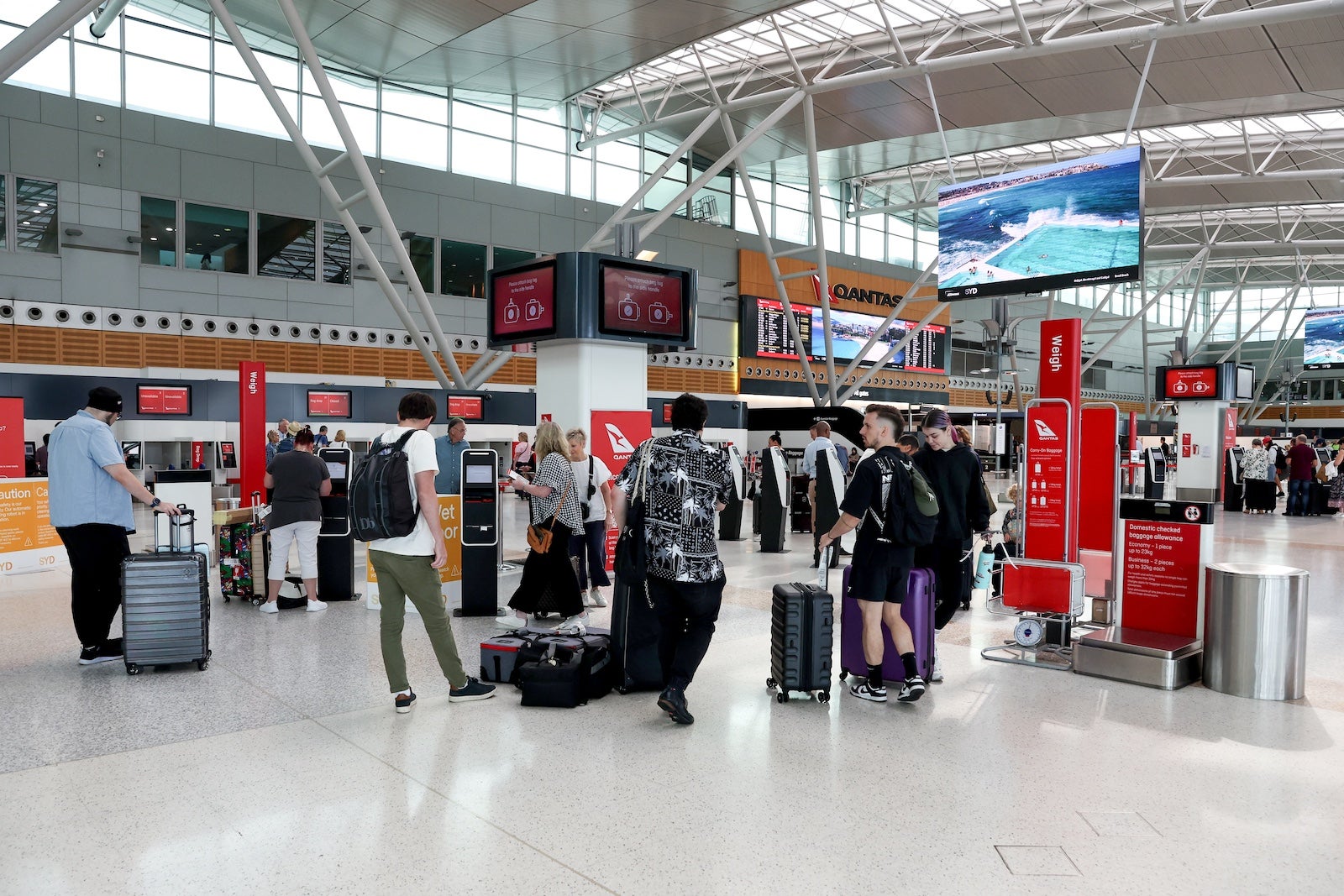Get Daily Travel Tips & Deals!
By proceeding, you agree to our Privacy Policy and Terms of Use .


Traveling with Medications: What You Need to Know
Lindsay Tigar
Lindsay Tigar is a travel and lifestyle writer with a constant thirst for adventure and exploring new lands. You can find Lindsay globetrotting when the mood strikes, making sure to find time to explore both the wine and fitness scene in countries across the globe. Her work has appeared across dozens of outlets; learn more at LindsayTigar.com .
Travel Smarter! Sign up for our free newsletter.
If you’re heading out on a long trip—or moving abroad—and you rely on prescriptions, it’s vital to your health to know the rules about traveling with medication. “Millions of Americans are dependent on medicines and with the globalization of travel, access to prescription medicine is even more crucial,” explains Dr. Robert Quigley, senior vice president and regional medical director at International SOS .
From how to get more than a 30-day supply of pills to what you’ll need from your stateside doctor to get a prescription abroad, here’s advice from international healthcare experts about traveling with medication.
Bring a Note from Your Doctor

Dr. Christopher C. Hollingsworth, MD, a general and endovascular surgeon who has practiced in Europe and the United States, says it’s unlikely you’ll get stopped at customs or border control because you’re carrying more than a month’s supply of medicine. However, having an official prescription on hand when traveling with prescription medication is never a bad idea.
“In general, countries honor the rights of travelers to transport their prescribed medications with them,” Dr. Hollingsworth explains. As long as you have supporting documentation about your medical condition (ID cards or a letter from a physician), you are unlikely to have a problem.
Dr. Brendan Anzalone, a doctor of osteopathic medicine and the president and chief medical officer at AeroMD Air Ambulance , suggests going digital with these forms, as they can get lost or creased throughout your travels. This will ensure you won’t have to go digging if you’re questioned.
What to Pack in Your Travel First-Aid Kit
Keep Medicines in Their Original Bottles
Again, while it’s unlikely you will face any sort of issue when you’re flying with medication, Dr. Anzalone still recommends keeping your pills in the original bottle—complete with the sticker on the front with your name and doctor’s name—as an extra safety precaution. “Carrying your medication in [its] original prescription bottle with a label on it from the pharmacy is helpful if there are any questions in the security line,” he explains.
If you don’t have room in your luggage for the full-size bottles and must downsize, you can pack a small day-of-the-week pill organizer rather than several bulky bottles. Ensure you have documentation from your physician to avoid any potential issues. Paul Tanenbaum, R.Ph., a retired pharmacist, offers this tip if your original prescription bottle is too large: “Make friends with your pharmacist and see if he or she could make you a smaller travel-size bottle for you to fill up.”
Learn the Laws Around Traveling Internationally with Medications
The recommendations for domestic trips also apply to traveling abroad with medication. When flying internationally with prescription medications, the U.S. Department of State recommends storing medications in their original labeled containers and bringing a copy of a doctor’s letter to show customs officers and other officials if necessary. The prescription should note the brand and generic name of the drug.
If you’re taking an unusual drug or one that contains narcotics such as sedatives, carry a note from your doctor explaining what the medication is and why you need it.
Note that some over-the-counter drugs legal in the U.S. may be illegal elsewhere. For example, painkillers containing codeine are prohibited in the United Arab Emirates. Always double-check before you fly.
Exercise Caution with Herbal Medicines

Flying with herbal medicines or supplements to international destinations can be tricky since each country has its own laws about what’s allowed in. To find out what may be restricted in the countries you’ll be visiting or transiting through, refer to the embassy website or contact local consulates.
Make sure herbal remedies and Ayurvedic medicines are in clearly labeled, well-sealed containers, preferably in original bottles. Although the TSA doesn’t require it, it may be helpful to bring a doctor’s note explaining your remedies’ intended use. Keep up to date with any changes in TSA rules by downloading its free MyTSA app ( iOS | Android ).
The Best Over-the-Counter Sleeping Pills for Long-Haul Flights
Always Pack Medicine in Your Carry-On
Now that you have the prescriptions you need and the note from your doc to prove your case, it’s time to pack. Depending on how much medicine you need each day, you may be tempted to shove your pill pack into your checked bag, but Dr. Anzalone warns against it: “It is best to keep medications in your carry-on baggage. If your checked baggage gets lost, you will still have your prescription medications with you. Remember some aircraft cargo holds are not temperature controlled, which may affect temperature-sensitive medications.”
If you’re worried about bringing medication that must be refrigerated (like insulin, for example) on a plane, Dr. Hollingsworth offers the TSA regulations on cool packs that are allowed through the gates. “Domestically, gel-cooling packs are allowed if frozen at time of presentation to security,” he notes.
Liquid medications (prescription or over-the-counter, like saline solution or eye drops) aren’t subject to the TSA’s three-ounce limits. However, you are required to declare anything over that amount to security officers and present it for inspection.
You may also travel with accompanying items, such as IV bags, pumps, and syringes, as long as they’re declared before you begin the screening process. All of these items will be X-rayed unless you request a manual inspection.
Bring Extra Medication
Dr. Hollingsworth’s rule of thumb is to bring twice the amount of medicine you need and to separate the bottles between your carry-on and your personal item. Why? Two words: flight troubles. “Changes or delays can have a butterfly effect that can have repercussions for the rest of your trip. Plan for the unexpected and pack extra medication you might need for an unplanned longer stay,” he says.
Exercise Caution When Flying with Narcotics

If you’re traveling with any type of prescribed narcotic used to relieve pain, such as Vicodin, Oxycontin, Percocet, or codeine, you might want to bring your prescription documentation, as well as a doctor’s note. Though this is not required by the TSA, it may prove helpful when getting through security. Since these types of drugs are widely abused, security screeners may be suspicious if they are unaccompanied by the proper paperwork. Having the original prescription will prove the pills’ necessity, and avoid any further delays or additional questioning.
The trouble of traveling with only a doctor’s note is that unless it was written in the previous month, it may lose validity. Prescriptions are clearly dated and include the signature of your doctor. Simply make a photocopy of each prescription before you have it filled. The photocopied version will be null and void, but this does not alter it as a valid document.
To take extra precaution, you may also want to travel with phone numbers for your pharmacy and prescribing doctor. This may seem like an unnecessary hassle, but it could prevent delays and problems at the airport.
10 Hotel Room Exercises You Can Do Without Any Workout Gear
Be Strategic About Your Meds
If your carry-on is just too heavy to meet those puddle-jumper restrictions, Dr. Hollingsworth challenges you to be strategic. While you might want to take your mini-sized bottle of Advil, those sorts of medications are available everywhere.
“Give priority to any medications that are vital to your functioning or survival. Asthma inhalers, diabetic medications, anti-seizure medications, and blood pressure medications come to mind. Make sure to bring medications that have rebound or withdrawal symptoms if you run out,” he says. “A trip is not a good time to see how you function without your arthritis or anti-anxiety medications.”
Consider Travel Insurance
Many factors influence whether you should purchase travel insurance . How long will you be traveling? Where are you going? Will you be lounging by a beach for a week or undertaking adventure activities in a rainforest? Do you have ongoing medical conditions that might need care?
If you’ll need health insurance for your trip, Dr. Quigley recommends exploring your options before heading overseas to determine what policy and plan are best for you. You can also work with assistance companies—like International SOS—to help you if you’re struggling with a health situation overseas.
Make a Date with Your Doctors

If you’re leaving the U.S. for an extended time, in addition to getting foreign currency and shedding tears at your farewell party, you should schedule pre-departure appointments with your doctors. During these visits, get a full physical and begin a discussion about your wellness needs while traveling. Work with your physician to plan for the medications you’ll need. Medical professionals can help you secure more than a 30-day supply of any medicines along with the necessary paperwork. They can also offer advice about what you need to bring to keep your health top-notch.
Find the Loopholes for Refilling Prescriptions Overseas
Dr. Quigley explains that prescriptions cannot be filled abroad, nor can your primary care doctor call in a prescription for you. But there is a way around it: Know the generic forms and other names of the same medicine. Depending on the country, you may be able to get the medicine without a prescription.
As an example, Dr. Hollingsworth was able to walk into a pharmacy in Paris and receive antibiotics for a pal with a serious ear infection—no note required. Even so, packing a few “just in case” prescriptions before you leave will help ease your worries. Your primary care doctor or a travel clinic can help you navigate the options.
Tanenbaum recommends caution: “If you must obtain your meds from somewhere other than your U.S. pharmacy, beware that there is a major problem of counterfeit drugs out there.” He also notes that brand and generic drug names may differ from one country to another: “The same name may be for a totally different medication; if you have to get some while overseas, it may not be what you usually take so that it does not treat your medical condition, and may actually be dangerous for you to take.” Make sure you’re visiting a reputable pharmacist (ask for a recommendation from your hotel or the local tourist board) and that you double-check whether the drug you’re requesting actually treats your condition.
How to Get Over Your Fear of Flying
Most Importantly, Plan Ahead
Plan ahead, especially if you are switching time zones and have to take medicine at a certain time of day. “Have a medical itinerary run parallel to your day-to-day travel itinerary. Plan out the nearest towns [to] where you’re going to be and identify the best providers for you based on your specific medical needs. Don’t let it be a fire drill when you get there,” recommends Dr. Hollingsworth. “If you know in 30 days [that] you need to have a prescription refilled, and you know where you will be within that time frame, then research which medical professional will be best for you. Do your homework.” It just may save your trip—or even your life.
Tips to Stay Healthy While Traveling
Want more expert tips and vacation inspiration? Subscribe to SmarterTravel on YouTube!
Editor’s note: This story was originally published in 2017. It has been updated to reflect the most current information. Molly Feltner, Jessica Labrencis, Patricia Magaña, and Michele Sponagle contributed to this story. A previous version of this story had an incorrect spelling of Paul Tanenbaum’s name. It has been corrected. Some of the links featured in this story are affiliate links, and SmarterTravel may collect a commission (at no cost to you) if you shop through them. As an Amazon Associate, we earn from qualifying purchases.
You Might Also Like:
We hand-pick everything we recommend and select items through testing and reviews. Some products are sent to us free of charge with no incentive to offer a favorable review. We offer our unbiased opinions and do not accept compensation to review products. All items are in stock and prices are accurate at the time of publication. If you buy something through our links, we may earn a commission.
Top Fares From

Don't see a fare you like? View all flight deals from your city.
Today's top travel deals.
Brought to you by ShermansTravel
9-Nt Dublin, Cork, Killarney & Galway...
Railbookers


Luxe, 7-Night Caribbean & Mexico Cruise...
Regent Seven Seas Cruises

Ohio: Daily Car Rentals from Cincinnati

Trending on SmarterTravel
Careful packing: Where your prescription could get you in trouble

When traveling, especially internationally, sometimes the pre-travel checklist feels like it's a mile long.
Not only do you need to do the obvious things like making sure your passport is still valid and verifying whether you need a visa , but you may also need to seek written approval from a country's government to bring certain medications abroad.
I must admit I didn't realize this was a thing until one of my TPG colleagues flagged this requirement she discovered when packing for her family's trip to Japan . Japan is just one country that strongly regulates travel with medicine.
Here's what you need to know about taking your medications to a variety of popular destinations that regulate travel with medicine.
Japan requires advance permission to enter with a variety of medications, including many common over-the-counter medicines openly sold in U.S. drugstores.
The Japanese government labels such drugs as "controlled substances," divided into six categories, including stimulants. Travelers who need these medications must apply for a "Yunyu Kakunin-sho" (or an import certificate), which should be declared and submitted to customs when entering.
Up to two months of approved over-the-counter medicines and four months of vitamins are permitted. Note that disposable contact lenses are also monitored, and those with a two-month supply or greater require an import certificate.
Travelers should also bring a copy of their prescription, along with a note stating the purpose of the medicine, if applicable.
Type of medicine : All medications containing stimulants, including over-the-counter allergy and sinus medications, plus Adderall listed here How to apply : Apply online for an import certificate through the Japanese Ministry of Health, Labour and Welfare Amount of medicine : Up to one month of allowable over-the-counter medication and up to a two-month supply of allowable vitamins Cost : N/A Processing time : N/A More information : Japanese Ministry of Health, Labour and Welfare ; Japan's Application for Import Confirmation ; Consulate-General of Japan in Seattle ; Japan Narcotics Control Department
Other Asian countries
- Thailand : Certain medications, including those containing codeine and drugs to treat ADHD, require a permit issued by the Ministry of Public Health .
- Hong Kong : Certain medications — including those with stimulants, such as sleeping pills and anxiety medication — require an import license and import certificate issued by the Department of Health .
- Singapore : Certain medications, including anxiety medication, sleeping pills and painkillers, require advance approval, per the Singapore Health Sciences Authority .
- China : Per various tourist organizations, including China Highlights , visitors must "provide written documentation from a medical institution to prove the necessity of the medicine," including sleeping aids, ADHD medication and painkillers.
- South Korea : Medicines classified as "narcotics" require advance approval via the Korean Food and Drug Administration .

Australia has a traveler's exemption for persons traveling to Australia to enter with certain prescribed medications, including Adderall. The Australian Government Department of Health and Aged Care directs travelers to either secure a prescription for the medicines they're carrying or seek a letter from their doctor specifying that the medicines they've been prescribed are for their personal use.
"Your doctor's letter must specify the name of the medicine and dosage. Ensure the medication remains in its original packaging with the dispensing label intact," per the Australian Government Department of Health and Aged Care. "This will assist with identifying each substance at the border. Be ready to declare all medication to the Australian Border Force upon arrival."
Type of medicine : Certain prescription medicines, including Adderall How to apply : N/A Amount of medicine : Up to three months' worth of medicine and medical devices Cost : N/A Processing time : N/A More information : Australian Government Department of Health and Aged Care
United Arab Emirates
Travelers to the UAE must apply for approval to carry controlled medication into the country. All other medication, including prescriptions for uncontrolled medication and over-the-counter medication, does not need prior approval. However, the government urges travelers to carry documentation for all medicine, including documentation explaining medical reasons for taking the medication and any other supporting documents.
To determine if your prescription is considered controlled, check with your doctor.
Type of medicine : Controlled medicine, including narcotics and psychotropics How to apply : Online through the United Arab Emirates Ministry of Health & Prevention Length of time : Maximum three-month supply for narcotics and controlled medicines; six-month supply for prescriptions Cost : Free Processing time : One business day More information : United Arab Emirates Ministry of Health & Prevention
Europe and Schengen countries

The Schengen Area includes most European Union countries. If you are traveling to this area, a Schengen certification for medicines that fall under the Opium Act, including narcotics, is required. Specific medicines bound by the act include strong painkillers, sleeping pills, anxiety drugs, ADHD medication and medical cannabis.
Since specific requirements vary by each country within the Schengen Area, you should contact the appropriate health agency of the country in question. For example, the Netherlands Ministry of Health, Welfare and Sport provides instructions for travelers to the Netherlands to help obtain this certificate, including a link to the application and a list of prohibited medications that fall under the aforementioned Opium Act. Information can also be found via the relevant U.S. Embassy and or Consulate .
Also note that some countries, including Greece , require further authorization for specific medicines, such as codeine without a prescription, via Greece's National Organization for Medicines.
Bottom line
Regardless of where you are traveling, it's a good idea to keep medicines in their original prescription packaging; this shows the purpose of the medicine and that it's for you and only you. As noted, it's also helpful to pack any accompanying doctor's note.
Related reading:
- Everything you need to know about State Department travel advisories
- When and how to renew your passport, according to the State Department
- I stayed at an IHG voco hotel for the first time — here are 7 reasons I'd stay again
- Everything you need to know about traveling with medication
- The best travel insurance policies and providers
You are using an outdated browser. Upgrade your browser today or install Google Chrome Frame to better experience this site.
Use this checklist to prepare for your next trip abroad. Make sure to bring items with you, since quality of items bought overseas cannot be guaranteed. Not all of these items may be relevant to you and your travel plans.
Pack for a Healthy Trip
Prescription medicines
- Your prescriptions
- Travelers’ diarrhea antibiotic
- Medicines to prevent malaria
Medical supplies
- Glasses and contacts
- Medical alert bracelet or necklace
- Diabetes testing supplies
Over-the-counter medicines
- Diarrhea medicine (Imodium or Pepto-Bismol)
- Antihistamine
- Motion sickness medicine
- Cough drops, cough suppressant, or expectorant
- Decongestant
- Pain and fever medicine (acetaminophen, aspirin, or ibuprofen)
- Mild laxative
- Mild sedative or sleep aid
Supplies to prevent illness or injury
- Hand sanitizer (containing at least 60% alcohol) or antibacterial hand wipes
- Water purification tablets
- Insect repellent (with an active ingredient like DEET or picaridin)
- Sunscreen (with UVA and UVB protection, SPF 15 or higher)
- Sunglasses and hat
First-aid kit
- 1% hydrocortisone cream
- Antibacterial or antifungal ointments
- Digital thermometer
- Oral rehydration salts
- Antiseptic wound cleaner
- Aloe gel for sunburns
- Insect bite anti-itch gel or cream
- Disposable gloves
- Cotton swabs (Q-Tips)
- Copies of your passport and travel documents
- Copies of all prescriptions (medications, glasses, or medical supplies)
- Health insurance card and documents
- Proof of yellow fever vaccination (if required for your trip)
- Contact card with the street addresses, phone numbers, and e-mail addresses of: Family member or close contact in the United States
- Health care provider(s) at home
- Lodging at your destination
- Hospitals or clinics (including emergency services) in your destination
- US embassy or consulate in the destination country or countries
Additional Resources
- Check the Transportation Security Administration website for updates on permitted and prohibited items, including medicines that you are allowed to carry onto an airplane.
- Some items may not be allowed in other countries. It is a good idea to check the Customs and Import Restrictions section of the U.S. Department of State Tips for Traveling Abroad.
- Enroll in the Department of State Smart Traveler Enrollment Program to get the latest safety updates and help in an emergency.
File Formats Help:
- Adobe PDF file
- Microsoft PowerPoint file
- Microsoft Word file
- Microsoft Excel file
- Audio/Video file
- Apple Quicktime file
- RealPlayer file
- Zip Archive file
Exit Notification / Disclaimer Policy
- The Centers for Disease Control and Prevention (CDC) cannot attest to the accuracy of a non-federal website.
- Linking to a non-federal website does not constitute an endorsement by CDC or any of its employees of the sponsors or the information and products presented on the website.
- You will be subject to the destination website's privacy policy when you follow the link.
- CDC is not responsible for Section 508 compliance (accessibility) on other federal or private website.
- Search Please fill out this field.
- Manage Your Subscription
- Give a Gift Subscription
- Newsletters
- Sweepstakes
- Travel Tips
Everything You Need to Know When Flying With Medicine — Including What to Do If It Gets Lost
Including how to pack medicine effectively and the TSA rules you need to know.
:max_bytes(150000):strip_icc():format(webp)/Cassandra_Brooklyn-f05dd805dc104fb9b15f42c24643d6d8.jpg)
Preparing for a trip should be part of the fun. After all, you get to plan outfits and make a packing list that matches all your activities. You get to plot out every moment of your adventure to come and even lay out a cozy outfit for the plane ride to get there the night before. However, if you’re someone who takes regular medication, you know there is at least one major stress point to preparing to travel: Figuring out just how to pack it.
From questions about prescription refills to TSA requirements, and right down to how much space you have in your luggage, packing medication for a trip can be tricky. But don’t stress too much, as we’ve got all the answers you’re looking for. Here’s what you need to know about traveling with medication.
Tanya Joy/Getty Images
Ensure you have refills available
Dr. Scott Kaiser , a family physician and geriatrician at the Pacific Neuroscience Institute in Santa Monica, California, shared with Travel + Leisure that travelers should confirm they have available refills on any essential medications before they leave for their trip. If they don’t, he suggested they call their doctor to request refills before departure, so it will be easier to fill a prescription during your trip if needed.
“When traveling, as with many things in life, it’s all about preparation—especially being prepared for the unexpected,” he said.
Kaiser added, because packing and preparing for travel can be stressful – and that stress can interfere with our memory – checklists and reminders are extremely helpful. “Either good old-fashioned paper or electronic reminders and alarms on your smartphone or other devices can be a lifesaver,” Kaiser said.
Always pack medication in carry-on luggage
Nobody anticipates their luggage getting lost or delayed , but as the U.S. Department of Transportation reported, 191,624 bags were “mishandled” in February 2022 alone. Rather than risk your medication becoming a part of this statistic, always carry it in your carry-on bag. Trust me — I am one of those 191,624 mishandled bag owners.
My mother, who lives with Parkinson’s, regularly flies to stay with me in New York City. She requires a significant amount of medication. However, it’s always placed in her bag, my sister’s, or mine. But following a last-minute flight cancelation and rerouting, my sister asked the gate agent to check our mom’s carry-on bag, believing this would help lessen the stress on our mom. Given the rush, my sister forgot to remove medication from our mom’s carry-on bag, and, lo and behind, this would be the day her bags would be left behind in Boston. So please, do as I say, not as I do.
Bring extra medication just in case
Just like you should always place medication in carry-on luggage, you should also always bring more medication than you anticipate needing. For example, we organize my mother’s medicine in a seven-day compartmentalized pill box, one for each day of the week. But, to ensure she can stay longer if she wants or needs, we pack a few extra days, so we’re never scrambling to fill (or stretch) essential medications. Need a hot tip? Buy a second, seven-day pill box to easily store your extra meds and keep things organized.
Understand TSA rules
The Transportation Security Authority (TSA) is famous for its liquid rules and security checks. But, Daniel Velez, a spokesman for the New England Region with the TSA, explained that airline passengers may always bring medically necessary liquids, medications, and creams in excess of 3.4 ounces (or 100 milliliters) in their carry-on bag.
He added, the TSA “strongly recommends that passengers clearly label their medication to facilitate the screening process.”
The TSA also compiled a helpful Disabilities and Medical Conditions page along with a Traveling with Medication video that should answer any lingering questions you may have.
What to do if your medication is lost
If your medication is lost or delayed during transit, immediately file a lost baggage claim with your airline before leaving the airport. Save the claim ticket (and take a picture of it), as you’ll need this to follow up on your claim.
If you have refills available on your medications (and you should, because you confirmed that before your trip, right?), you can transfer prescriptions to a local pharmacy, particularly if you use a chain like Walgreens or CVS. If you don’t have refills available, you’ll need to call your prescribing doctor.
Keep in mind that some medications cannot be issued without a new prescription. In this case, pharmacists will usually refer patients to a local urgent care facility. If the medication cannot be refilled for another 30, 60, or 90 days, you may have to call your health insurance provider to request an early refill authorization. Again, avoid this by checking in with your doctor before your travels, or at the very least, have all these numbers (your doctor, your insurance, and the number of a local urgent care) saved in your phone before take off, just in case. Because, as the saying goes, “luck favors the prepared.”
Related Articles

IMAGES